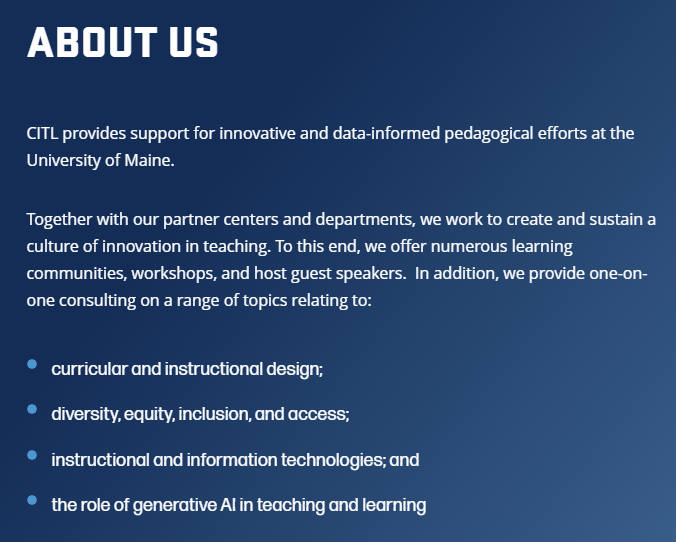information for faculty
Student Accessibility Services is dedicated to working with the University of Maine Faculty to facilitate an atmosphere of inclusion and cooperation in the classroom.

Student Accessibility Services (SAS) utilizes a system-wide tool, called Accommodate, to manage student disability-related accommodation requests. Accommodate is accessible to students and faculty through the UM Portal and can be accessed with your single sign-on (SSO) credentials.
Students have the ability to communicate directly with faculty about their accommodations and schedule appointments and exams with SAS. Faculty have the ability to access student accommodation letters connected to each course and upload exams directly to the system.
- 24-hour access to student accommodations in the web-based system
- Ease of log-in using University single sign on credentials
- Eco-friendly approach which eliminates the need for hard copies of accommodation letters
- Email inbox friendly because accommodation letters are no longer being sent via email
- Accommodations are clearly listed under the student’s name in each list of enrolled students for the course
- If a hard copy of accommodations is preferred, faculty have the ability to print off a list of students in each of their classes in Accommodate that includes each student’s approved accommodations
Need help using Accommodate? Review our Faculty Training Materials!
For information specific to test proctoring, please view this Test Proctoring Information for Faculty.

brightspace
There is a new accommodation tool in Brightspace that will make it easier for faculty members to assign extended time for Quizzes:

additional information
For information on creating accessible materials for the classroom, please visit the Center for Innovation in Teaching and Learning.
Common Questions and Concerns About Accommodation Requests
What is an accommodation?
Do I need to change my curriculum or expectations for a student with a disability?
Do accommodations such as extra time on tests give students with disabilities an unfair advantage over other students?
Who determines that the student has a disability that requires an accommodation?
Can I refuse to give a student an accommodations or alter the accommodation requested?
We are always available to answer any questions or concerns you may have. Please contact Student Accessibility Services at 207.581.2319
Accommodations for Students with Disabilities, Important Reminders
Disability Statement for Course Syllabi: Faculty members are required by the Undergraduate Program Curriculum Committee (UPCC) to include an accommodation statement in their syllabi. The following is an example of a possible statement:
If you have a disability for which you may be requesting an accommodation, please contact Student Accessibility Services, located at the Center for Accessibility and Volunteer Engagement at the UCU, 139 Rangeley Rd, um.sas@maine.edu, 207.581.2319, as early as possible in the term. Students may begin the accommodation process by submitting an accommodation request form online and uploading documentation at https://umaine-accommodate.symplicity.com/public_accommodation/. Once students meet with SAS and eligibility has been determined, students submit an online request with SAS each semester to activate their approved accommodations. SAS creates an accessibility letter each semester which informs faculty of potential course access and approved reasonable accommodations; the letter is sent directly to the course instructor. Students who have already been approved for accommodations by SAS and have a current accommodation letter should meet with me (the instructor of the course) privately as soon as possible.
Quick Tips and What to Avoid
Keep it Confidential. Make every attempt to discuss the student’s disability accommodations and needs in private. The student may choose to disclose their disability to you in a public location (such as the classroom after class has finished) but the accommodation process is best facilitated in a private setting. As a faculty member, you should be mindful of disclosing a student’s disability without their expressed permission.
What should I do when asked for an accommodation?
The University has designated Student Accessibility Services (SAS), as the office coordinating accommodations and services. Please refer the student to SAS where:
1) Medical and psychological documentation can be reviewed and stored
2) Appropriate accommodation alternatives are explored
3) Accommodation Request Letters are prepared for the student to deliver to faculty
Can I grant an accommodation without referring to Student Accessibility Services?
When a student requests an accommodation, which you are comfortable with, such as tape recording the class, you may certainly comply. It is crucial however, for the student to understand that you are making a negotiated “arrangement” with them, which only extends to your class. An official accommodation for disabilities is only granted through SAS after the student:
1) Self-identifies as having a disability
2) Provides current appropriate documentation of disability and need from a qualified medical or licensed professional
3) Specific accommodation or service is requested and reviewed
Don’t just say “NO”. Remember that legally and ethically your actions toward a student requesting a disability accommodation need to be a reflection of the University’s policy and procedures. Denial of a request represents a decision with potential legal implications. Consultation with Student Accessibility Services or Equal Opportunity must take place prior to a decision to deny, assuring that the decision will be in compliance with the Americans with Disabilities Act.
